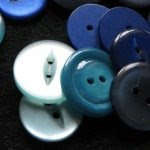Is actually turning out to be harder than I thought it would be!
Part of the problem, I think, is that many sellers are already pricing their handmade items at wholesale prices. As well as selling commercially made items, I do actually sell handmades. Sometimes. I see a lot of people get confused about pricing, but really, it is easy.
Cost of materials + your hourly wage/overheads x time taken + % profit = wholesale
Wholesale price x N = retail, N being the markup. I double it, but everyone has their own preference. For those making small, repeatable items, you can scale up depending on order size.
Really. Not that hard.
The point about selling wholesale is that the person buying large quantities is going to be doing a lot of the work for you. They're not trying to get rich off the fruits of your labour. Really. They will have a shop to maintain, or a website to host. They need to promote, store, package and post your items. They will need to advertise. Not on free PW blogs that have a handful of readers, but targetted advertising that will bring in lots of customers. And, with all of this, they still need to have their business profitable in order to support the artisans who supply the store, increase product range and pay the bills.
Granted, not everyone is trying to run a business. For some it is a hobby, a fun pastime that brings in a bit of money. Fine. But wouldn't it be nice to actually make a bit of money?
Try pricing for retail. You might even end up selling more.

yep - I'd like to make more money!
ReplyDeletehttp://niftyknits-somuchyarnsolittletime.blogspot.com/2009/04/whats-it-worth-to-you.html
You are very right. I recently upped my prices slightly as I realised I wasn't taking time into consideration at all
ReplyDeleteSo true. I upped my prices a few months ago and did actually sell more. The problem does stem from people making and selling as a hobby and not caring if they make money or not. I was at a fayre last weekend and the amount of sellers who were claiming that they only sell for fun was rather demoralising to someone who is actually trying to make money but can't because if she prices things how she should, it looks expensive in the marketplace.
ReplyDeleteGreat post, the more people posting about pricing the better! Here's my two cents: http://kitschycoo.blogspot.com/2009/03/for-what-its-worth.html
ReplyDeleteYes!
ReplyDeleteMany people do not understand profits!
Many times at Farmer's Markets etc i hear "oh, i'm into profit now, i've taken the stall fee" --No -- you are only into profit once you have covered stall fees, materials & labour on the items you have made for that days market, other oveheads such as packaging , insurance etc
Completely agree with the last statement in the article and Nic's comment; higher prices aren't something to be feared. It's an odd psychological trick, but it's true that a buyer's perception is often expensive = luxury = quality.
ReplyDeleteOne issue I've found whilst trying to promote Coriandr is that craft markets are very nearly the same thing as flea markets in the eyes of far too many people. Underpriced goods is one of the main reasons for that I think. Handmade should carry a premiunm, not a discount!
I upped my prices last week after someone shared a spreadsheet with me that mapped it all out for the hard of understanding (i.e. me). I'm still learning but I am so used to being 'told' what I'm earning in my freelance work - the publishers usually set the rate - that I often undersell myself. I'm told it's a British thing ;-)
ReplyDeleteAh, thank you all! I'm glad to know I'm not alone.
ReplyDeleteNic - I agree. Been there, done that. Stopped doing the craft fairs! Well, not all of them, but I did get more choosy about which I applied to and had a good look round them before applying. It worked - once I found a different venue I was taking home £2-300 a time, instead of enduring 2-300 omments about being overpriced!
Mat - I was going to come back and make that same point, only you beat me to it! Granted higher prices do not guarantee quality but when I see things that are cheap in price thena small voice starts muttering that if the maker thinks so little of their skills and their time, can I be sure that they value the quality of their work?
Claire, I'm not sure it is a British thing. I have a germ of an idea as to where the attitude may come from, but that, I think is going to be a new post!
And now I must go back to trying to find more people who will sell me buttons at wholesale quantities and prices :-)
I'm having a similar problem, in that buyers at craft/farmers markets etc seemed to expect to be able to buy genuine handmade artisan objects for the same price as machine-produced goods (or those produced en masse by cheap foreign labour, but that's a whole other rant :/ ). At those sorts of prices, I barely cover material costs, let alone factoring in labour. I'm of the opinion that my skill level warrants charging above minimum wage for my time, not below, and so I simply won't make items where the market price is below what it costs me to produce. I've found that running commissions and smaller handmade decorative objects like corsages, bags & lavender pillows through reputable local craft galleries is a much more effective way of making a business of it: buyers coming into those galleries are more appreciative of the idea that unique artisan-produced goods warrant higher prices than the mass-produced disposable items.
ReplyDelete